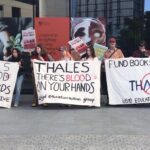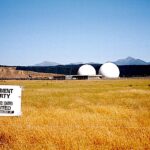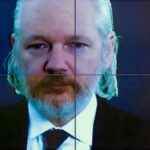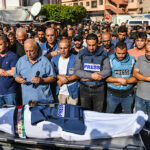In Afghanistan, military lawyer David McBride quickly learned that there was an expectation for him to look the other way when he saw evidence of war crimes. But two early incidents set him on a fateful track to defy his commanders and blow the whistle on the secret cover-up of Australian war crimes.
After he leaked Defence documents to the ABC in 2017, he was charged, and the ABC was raided by Federal Police wanting evidence against him and the journalists. In November 2023, the Supreme Court threw out his right to a public interest defence, saying it was his sole duty to follow orders. McBride plead guilty and now awaits his sentencing.
Now, for the first time, details of two earlier incidents that put him on the pathway to whistleblowing. The full story of how he decided to reveal alleged Australian war crimes has been told in his new book, ‘The Nature of Honour’.
The reason the Afghans were fighting us now was because we were here. The more bases we built, the more people came to fight us for invading their land, just as we would have done if they’d sent an army to Australia.
Our invasion was proving to be counterproductive. By sending more troops, as President Obama had done in 2011, we didn’t quell the violence, we increased it.
I continued to speak to my wife Sarah about once a day in the room where the phone calls were made and she shared news about the kids. It was getting hard for both of us to maintain the façade that everything in Afghanistan was okay.
By this stage about six Australian soldiers had been killed, two of them shot in the back as they were walking around the base. Sarah would have seen their faces on the television screens in the gym, or on morning TV.
One time, there was a rocket attack while I was on the phone to her, and she heard the deafening sirens blasting ‘Incoming. Incoming. Incoming.’ I quickly told her not to worry but that I had to go.
The first thing that told you someone was dead was that the phones didn’t work. In order to make sure the padre got to the widow’s house before the gossip did (and in 2011 they all were wives), the phone lines between Tarin Kot and Australia were cut off.

Jonesie was the first to die on our tour, although another young officer had fallen out the back of a helicopter on his way into Tarin Kot. Jonesie, though, had been shot.
He’d been standing, pissing at a makeshift outdoor urinal in the middle of one of the small bases, which were only as big as about two football pitches, surrounded by thick mud walls about three metres high, when one of the Afghans looking down on him from the guard tower had turned his rifle on him, shot him a couple of times, jumped over the wall and disappeared into the fields and houses around the base.
Jonesie was one of the salt-of-the-earth-type soldiers who made you proud to be in the Australian Army. Young, handsome and fit, he was a cook for a small satellite base an hour or so drive from Tarin Kot by armoured vehicle.
I was sent to do a short legal report on his death. When I arrived there, I could see his kitchen was well organised and a relaxed kind of place, where the soldiers got some relief from the danger and boredom of their patrols.
While there was no suggestion he was deliberately targeted, I could see that if you wanted to really break the morale of a small base, killing the cook was a good place to start – with the mess hall being where people went to let off steam, and now they couldn’t even do that without being reminded of their loss.
While it was always sad to be looking at the ‘crash scene’ where some young person had lost their life, this was our job. The base was jumpy now, because, while the day before the Afghans and Australians had been laughing and joking together and had even played cricket together, today both sides eyed each other warily with their backs to the wall, and their hands on their rifles.
We were simply the latest in a long line of foreign invaders
One interesting thing came out of the incident; namely the ease with which the shooter had managed to escape the area, even though we’d put drones in the sky, and had helicopters and patrols everywhere. I found out later that he’d hidden in some bushes near the river and asked a local farmer for help.
He told him straight up, ‘I’ve just killed an Englishman,’ and help was given – not just to be hidden but to be transported all the way out to Pakistan.
While we were slightly bemused that he’d described Jonesie as ‘English’, it wasn’t because he was ignorant. He – and others – called us English, not caring whether we were or not, seeing us as simply the latest in a long line of foreign invaders.
It was clear that when the Allied Forces left Afghanistan – as we would – the shooter, and others like him, would be considered heroes who’d fought against the foreign enemy.
They found the shooter eventually. After a month or so in Pakistan, he returned to his family home in the north-east of Afghanistan.
I don’t know whether it was informants or the eye-in-the-sky satellite spying, but it seemed to be known exactly where the shooter’s family lived, and that he’d made it home, and told his father what had happened.
A US team was dispatched, with an Australian SAS soldier embedded, and one night he was shot dead.
Our approach was always to maintain that we’d acted under international law, and if we hadn’t, to lie about it.

The problem was that two groups of people knew the truth: the SAS and the local Afghans. One concluded that it was not just okay, but required for us to lie, while the other concluded we were full of shit.
At least the Taliban were honest about who they murdered.
Something was seriously not right in the Higher Command
In early December 2011, I took another visit to the now not-so-shiny new prison – which was becoming more of a health hazard each day, black mould now growing due to poor hygienic conditions. I was brought in to see a new captive. It was routine practice that I’d meet the new captives and ensure they hadn’t been tortured. Generally, they were rather bemused, as the decades of violence had made them stoic. Nor did it seem to be in the nature of the staff to abuse prisoners just for the sake of it.
I got to know the prison staff and I liked them. The prison director and his deputies were proud Pashtuns. They seemed to have agreed to work with us because they didn’t like the excesses of the Taliban. However, they were becoming increasingly frustrated, since we weren’t giving them the tools to keep it in working order, which set them up for failure.
I was only required to interview prisoners who’d been taken by the Australian forces, or by the Afghan soldiers we were training. They were all assigned numbers and were brought to me in a room with a guard. Each of them told me their story, then returned to their cell. They seemed to be surprisingly honest, and when I asked them if they’d been treated badly, or if the food and conditions were adequate, they’d say things like, ‘Oh, I lost a tooth when I was captured, but that’s only to be expected really. As for the food, it’s pretty good – no complaints.’
I also had to check on those who’d been in the prison for some time. I could tell, from the photos I’d take of them each month for my records, that they were putting on weight, and generally looking better each time.
It turned out that one prisoner I interviewed had been brought in mistakenly, because he hadn’t been captured by Australian soldiers, and was therefore beyond my jurisdiction. With everything being done through a translator, it took a few minutes before we resolved the confusion.
By then, he’d already said that, after being captured by the Afghan police and before he was bought to the prison, his hands had been manacled to the roof of a holding cell in another building. He’d been left hanging by his hands in agony for a day, then beaten with an iron bar around the head. He showed me his scars and bruises, and I duly took photos of them with the camera required for the purpose.
I wasn’t particularly shocked, but under our training and protocols it had to be reported. I put together a brief detailing what I had seen, including the photos, and stating that his story had the hallmarks of truth about it.
What happened next was another step in my belief that something was seriously not right in the Higher Command.
Reporting of abuse was not something that one did
Immediately after I’d made the relatively mild report, the phone started ringing from panicked political advisors. It didn’t seem to be the beating they were concerned about; rather, that I hadn’t ‘got the memo’ and that reporting of abuse was not something that one did. While no one was expressly saying it, they seemed angry that I didn’t just look the other way.

What I was equally incensed about was that I’d done many weeks of training in legal standards, much of it paid for by the ADF, and it had all told me the opposite. There now seemed to be an assumption that we were meant to pretend to do things properly for the public appearance in Canberra, but in practice you should cover bad things up if you saw them.
‘Just send a report to Kabul,’ the political advisor said to me, referring to the US headquarters, ‘and then it’s no longer your problem.’
But I knew this was bullshit. Under the Geneva Conventions, I had a positive duty to ensure that the report wasn’t just made, but that an investigation followed. Ignored reports were the same as no report at all.
US headquarters might make a decision not to investigate, but I wanted to see that in writing. However, I knew they wouldn’t dare investigate, preferring the idea of plausible deniability, in order to later claim they had no knowledge of the incident. But I knew that if the story came out, I’d be in the frame if it seemed that I’d known of the torture and done nothing about it.
I got a call from the highest-ranking Australian officer in Afghanistan, a major general, who was widely tipped to be chief of army. She oozed charm with me, and said, ‘What a terrible experience,’ and tried to reassure me that no-one was suggesting to cover it up.
I thanked her for her call and played along, but my mind was made up. I would put in a confidential report to the Red Cross representation in Tarin Kot.
He was a charming Dutchman who I got along well with, and who was brave enough to live in the city with only a sleepy local guard. There was no danger that he’d misuse the information, and I believed he’d do the right thing – namely, that he’d speak confidentially to the Afghan police and ask them not to string people up and hit them with iron bars.
Giving my report to the Dutchman might well have no effect, but turning a blind eye to such things, which the Afghans knew we knew about, gave them the message that we secretly thought torture was okay, whatever we said in public.
So you might say that my informing the Red Cross representative of possible prisoner abuse, despite being told not to, was probably my first piece of whistleblowing.
It didn’t make me feel superior; if anything, it made me quite nervous, as I knew the POLADs, the Political Advisors from the Department of Defence, and the major general could damage my career if they found out.
It was a risk I decided to take. I knew the law, and I knew I was right.
—
This is an edited extract from the new book written by ex-Australian military lawyer, David McBride, titled ‘The Nature of Honour’, published in November 2023 by Viking-Vintage Books, Penguin Random House Australia.
—
Before you go…
If you appreciate Declassified Australia’s investigations, remember that it all costs both time and money. Join over 7,000 followers and get our Newsletter for updates. And we’d really appreciate if you could subscribe to Declassified Australia to support our ongoing work. Thank you.






